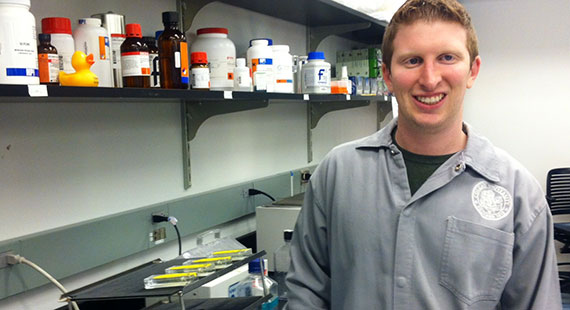
Molecular biology major Brandon Fiegoli, of Bedford, N.Y., has been conducting research with Professor Engda Hagos. (Photo by Natalie Sportelli ŌĆÖ15)
║¼ą▀▓▌蹊┐╦∙ students are sharing their experiences conducting research with faculty members on campus and in the field. This post is by molecular biology major Brandon Fiegoli, of Bedford, NY.
Every day, you hear about an infamous disease called cancer. You are constantly reading about celebrities with breast cancer, kidney cancer, and many more. You may even have friends or family members fighting the disease. But what do you really know about cancer? Where does it come from? Why does it occur and how does it harm us?
This semester, my research is under the direction of , and is aiming to answer some of these challenging questions. My project is focusing on what causes cancer to manifest itself in a personŌĆÖs body. Rather than developing the disease in a day, cancer is the result of several cellular processes that fail, causing the errors to build up.
The reason that regulation mechanisms fail to catch mutant cellular division can be due to a number of variables and why these errors occur is not yet fully understood.
In short, cancer is the uncontrolled replication of unhealthy cells that proliferate at a rate faster than the body can destroy them. This growth is regulated and monitored by the cell cycle. A cellŌĆÖs growth pathway has many points where it can be checked for normal functioning, but it also has gaps in unregulated development where these checkpoint mechanisms can malfunction.
I am working with the protein Kruppel-like factor 4 (KLF4). The protein has been found to directly regulate the cell cycle from going between the G1 phase, a segment when a cellŌĆÖs internal structures are growing, and S phase, when a cellŌĆÖs DNA is duplicated. Previous research and scholarship have found that when the protein KLF4 is not present, this checkpoint malfunctions and uncontrolled cellular division occurs.
However, there is more than one pathway that prevents mutant cells from duplicating and becoming malignant. Preliminary findings have shown that KLF4 may potentially have a connection to another protein called mTOR. In separate research, it has been determined that mTOR is known to amplify the growth of tumors, giving mTOR the moniker ŌĆ£Tumor Enhancer.ŌĆØ
MORE
My research aims to find a connection between KLF4 and mTOR. Through my initial findings, I have found that cells lacking the KLF4 protein have increased levels of mTOR and, therefore, have an enhanced rate of tumor formation. This semester I will continue to explore the relationship between these proteins.
Cancer will not be beaten by me or my lab alone, but it is research like this that is making strides to understand and beat this terrible disease.
ŌĆöBrandon Fiegoli ŌĆś14